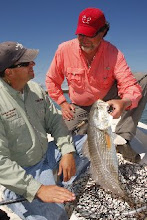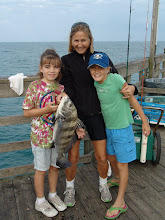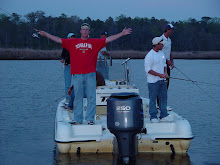Out-of-state tournament fishermen promise they won’t return until net conflicts are resolved; tournament trail eliminates annual visit
By Jerry Dilsaver
Even in the current depressed economy, fishermen plan their vacations around catching fish. It’s the opinion of many fishermen that North Carolina
Proponents of gamefish status for those three species believe that having them in abundance would be good for economies in coastal areas, that a healthy recreational fishery would bring more anglers to North Carolina North Carolina North Carolina
James McManus of Sylva, N.C., guides fishermen in several lakes, rivers and streams in North Carolina North Carolina , but his experiences on the IFA Tour have him heading to Florida
“I am a North Carolina
“When I vacation, instead of heading for the North Carolina coast, I pack up my family and drive to Steinhatchee , Fla. Florida
Rob Beglin of Pawley’s Island , S.C. , is another IFA redfish pro who has had some negative experiences fishing tournaments in North Carolina North Carolina
“The North Carolina coast reminds me of Louisiana
“When we got to the shallow bay on Saturday morning, it was criss-crossed with nets, and a commercial fisherman was at the mouth crossing back and forth as if to dare us to try to go in,” Beglin said. “We left and didn’t challenge him. Later, someone told us the fisherman was probably fishing for flounder. We said ‘No way’ to that. We had fished there Wednesday, then went back Thursday and Friday just to be sure the fish were still there, and (we) never caught a flounder. We catch some flounder fishing for reds, but hadn’t there. That bay was loaded with 25- to 27-inch redfish.”
Beglin said that in September 2011, he was in contention for Angler of the Year honors in the IFA’s Atlantic Division, and against his better judgment, he and his partner returned to North Carolina
“Fish had been scarce this year, so we decided to try and fish the mouth of the bay and catch fish that would be leaving,” Beglin said. “We managed to catch one nice fish, but found out where the others were later in the morning. When the netter picked up his nets, they were loaded with redfish, and they were large enough we could hear them thumping as they hit the deck. I was told the netter’s limit was 10 fish, but this fishermen put many more than that in his boat, and we never saw him throw any back.
“That afternoon after weigh-in and awards, I voiced how upset I was to the IFA officials, and several other fishermen had similar stories,” Beglin said. “I told them I wouldn’t fish in North Carolina North Carolina Surf City
Bart Schad, director of the IFA Redfish Tour, confirmed the IFA had restructured its trail for the 2012 season and did not have a tournament scheduled for North Carolina North Carolina the past five years and fished two there in 2008 – out of Beaufort and Surf City North Carolina
“In restructuring the IFA Redfish Tour, we weren’t specifically looking to cut the North Carolina Surf City
Chris Floyd, an IFA redfish pro from Charleston , said he had also made the decision not to return to North Carolina North Carolina Surf City North Carolina
“I don’t really understand this,” Floyd said. “It was explained to me that the commercial fishermen can only land a few redfish, so why would they be allowed to wrap up a bay with nets and interrupt a tournament that brings 50 to 100 boats with anglers and family members? Most of the tournament fishermen arrive by Wednesday before the tournament on Saturday, and a good number are there for the entire week before to the tournament.
“The economics just don’t add up,” Floyd said. “When we go to a tournament, we are renting motels or cottages, spending money at restaurants, local tackle shops, doing entertainment things, buying gas for boats and trucks and spending money in many other ways. Then, when we finish the tournament, all the fish are let go to stay in the area. Certainly, this has to be worth more to the local economy than the few drum the commercial fishermen can sell.”
Bobby Sands is an avid fisherman who lived in several Gulf of Mexico states before retiring to Southport . He said he initially judged the area by all the estuary and marshes around it and thought the fishing would be as good as Texas and Louisiana
“I was living near Corpus Christi , Texas Texas coastal lagoon now has excellent fishing, and Baffin Bay has become a place where 5-pound trout don’t even raise eyebrows, and 8- to 10-pounders are surprisingly common.
“Louisiana Louisiana Louisiana marshes are once again actually the Sportsman’s Paradise they proclaim on their license plates. The limit for redfish is five per day, and the limit for speckled trout is 25. Here, our limits are a single redfish and four trout. That’s a big difference.
“I know that given the opportunity, the North Carolina fishery would rebound quickly and could be as good as either Louisiana or Texas Texas and Louisiana



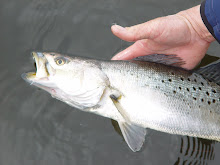



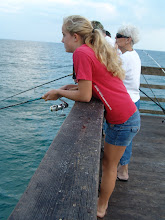

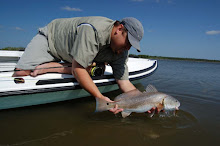.jpg)


